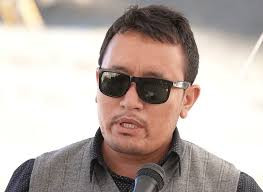September 24, 2025: Gunfire Shatters Ladakh’s Peace

September 24, 2025, will be remembered as a tragic day in Ladakh—a day when gunshots pierced the region’s long-held calm. Four young people lost their lives and around 90 were injured when a peaceful, 35-day hunger strike led by environmentalist Sonam Wangchuk ended in violence outside the protest site.
What began as a non-violent demonstration turned deadly when parts of the crowd set fire to the BJP office in Ladakh and moved toward the Hill Council Secretariat. Security forces opened fire without prior warning, witnesses said, sparking chaos and fear.
Who is to be held responsible for the violence? Why was live fire used? When asked for their views, Councillor Konchok Stanzin and NGO worker Tsering Nordon shared their perspectives:
Konchok Stanzin, Councillor, Chushul Constituency, LAHDC-Leh: September 24 is a black day in Ladakh’s history—something our peaceful region has never witnessed before. The indiscriminate firing on protestors, without prior warning or adequate crowd-control measures, is deeply unfortunate and highly questionable. Religious bodies, the Apex Body, KDA and many others are calling for an independent inquiry, which I strongly support.
From many videos circulating online, it appears the forces provoked the crowd with tear gas, which escalated the situation into chaos. The administration and local leaders failed to understand people’s concerns and the reasons behind the protest. Had the ruling leaders met the hunger strikers—who had been peacefully presenting Ladakh’s demands—instead of simply holding press conferences, the outcome might have been different. Years of unaddressed frustration, especially among the youth, boiled over because the government did not take Ladakh’s demands seriously. The delay in dialogue and the inability to handle the situation in time are major reasons for this tragedy.
The loss of four young lives is a matter of deep concern for every Ladakhi. Moreover, on September 23 a shutdown call was announced for the following day, urging people to gather at the hunger-strike site. It was clear a large crowd would assemble, yet the administration neither ensured adequate security nor imposed Section 144 to prevent escalation. With better precautions, this violence could have been avoided. Property damage is condemnable, but so is the taking of lives. Everyone involved—including the Centre—must accept responsibility instead of shifting blame.
I also question the response of LAHDC Chairman Tashi Gyalson, who issued a statement only after the violence. At the crucial moment, leaders should have met the families of those killed, visited the injured in hospital, and spoken to those detained, rather than simply announcing financial assistance. Words alone cannot heal these wounds.
Current restrictions and the internet shutdown are counterproductive; the more curbs imposed, the worse the situation may become. The arrest of Sonam Wangchuk is equally troubling. He has always advocated peacefully for Ladakh’s demands. I trust the Apex Body’s leadership and hope that ongoing talks with the Ministry of Home Affairs will soon bring a positive resolution.
Tsering Nordon, Director, Spospa Foundation: I am still speechless at the loss of four young lives on September 24. These brave youths faced bullets fired by security forces and will be remembered as martyrs who sacrificed themselves for the cause of Ladakh. Honouring their courage is essential—but even more important is demanding accountability. How could the forces open fire on unarmed citizens without any warning or non-lethal measures?
I studied in Delhi and have participated in large protests, including the Nirbhaya movement. I have seen water cannons, tear gas and lathi charges, but never live ammunition fired at demonstrators—certainly not at people’s heads and chests. Educated youth across Ladakh are united in demanding answers. Who gave the order to shoot? On what grounds? The young men who died can never return, but justice for them must remain a collective mission, even if it means petitioning the highest courts of the country.
This tragedy has also exposed the failure of Ladakh’s political leadership. Earlier crises already strained public trust; now that trust feels broken. If our elected representatives have any courage left, they must stand up and fight sincerely for Ladakh’s demands and for justice for these youths. At this moment, party politics and individual opinions are irrelevant. What matters is unity of purpose—not violent protest or inflammatory rhetoric, but steadfast, peaceful action. Sadly, calls for unity are often misinterpreted or twisted, with people slapped with FIRs for “instigation” or “provocation.” I appeal to every leader in Ladakh: look honestly at this situation. Do you have answers for what happened? This is not a time to hide behind office chairs. It is a time to stand with your people, speak out, and work for justice.
There is a wound in every Ladakhi heart. Announcing financial assistance to grieving families or the injured will not heal that wound or fill the empty space left behind. We condemn the cowardly act of firing live bullets at young civilians and demand accountability from all responsible.
Our demands are not outside the Indian Constitution. We are asking only for the rights it already guarantees. Yet some national media outlets have tried to portray Ladakhis as anti-national. This is not only false but insulting. The patriotism of Ladakh’s people is beyond question. Time and again, we have stood alongside the Indian Army to defend our borders—most notably during the Kargil War of 1999, and in other conflicts with neighbouring countries. Ladakhis have a long history of service and sacrifice for the nation.
To paint Ladakh as disloyal is to ignore our record and our reality. Our call for constitutional safeguards is not secessionist; it is a plea for protection of our culture, environment and way of life, within the framework of India’s democracy.
The four young martyrs of September 24 gave their lives not in defiance of India, but in pursuit of justice and dignity within it. Their sacrifice should unite us in peaceful determination, not divide us with suspicion. Justice for them is justice for Ladakh—and a reaffirmation of the values on which this nation stands.





